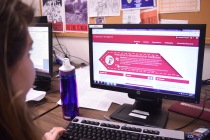By Margarita Artoglou and Kristen Santer

Blackboard can often cause headaches for its users. (Andrea Garcia/The Fordham Ram)
The use of technology in the classrooms at Fordham can be extremely varied. One class may rely on technology, while another completely disregards it. Although students may bemoan the small bandwidth of Fordham Wi-Fi or the occasional faulty smartboard, most professors find that Fordham’s IT services and technology offerings are average compared to other schools.
Fordham offers several workshops to help get professors accustomed to new technology offerings and IT updates. Some of the workshops include introductions to SMARTBoards, Blackboard and creating and editing video files. Professor Lance Strate also agreed with the general consensus, “It’s a progression for sure, but I have seen schools that are much worse off than we are as far as not having [technological resources].”
The continuous problem that professors seem to have with Fordham’s technology is Blackboard. Michael Plugh, a Communication and Media Studies professor, finds it frustrating. “Everything at Fordham is pretty straightforward, except Blackboard,” he said. “I’m sort of unwilling to get invested in Blackboard because I’m not convinced it has a life beyond itself.”
Other dissatisfied professors with Blackboard were not as nice as Plugh. “I hate Blackboard,” Professor Lance Strate said. “I understand why it’s used but I think it’s a really badly designed system.” It seems that discontent may be an understatement of the professors’ feelings about Blackboard. It clearly seems to cause more problems instead of making them simpler and more convenient.
Strate is not alone in terms of his problems with Blackboard. Many professors dismiss the system completely and use alternative, free software to communicate with their students. Among them is Professor Cornelius Collins, who finds Google Drive to be a much smoother user experience than Blackboard. “There are fewer steps [with Google Drive],” Collins said. “It’s integrated with students email and it suits my purposes. I find that Blackboard has built in so much functionality that it’s hard to do it in a streamlined way.”
At the point where professors are shunning paid-for software in favor of free substitutes, it is clear that Blackboard represents a blight on Fordham’s technological progress. Furthermore, if professors are choosing not to use Blackboard, then the university is needlessly wasting money on the program that could instead be put toward more fruitful pursuits.
In addition, many Fordham students are disillusioned by Blackboard. “It’s completely disorganized. I never know what assignments are posted for what day,” Nicole Cappuccio, FCRH ‘18, said.
Students have also expressed distaste with the way that professors under-utilize the application. “None of my professors ever use the grading system on Blackboard either, and I think that’s a waste when I could be keeping tabs on my grades that way,” said Cappuccio.
It is quite clear that Blackboard is an inferior platform for grading and source materials, especially when free platforms like Google Drive and WordPress are easily accessible. Fordham definitely needs to update Blackboard, either to a better platform or to a more workable interface with fewer bugs. However, the question becomes whether a university-wide platform like Blackboard is even necessary. Professors can just as easily use Google Drive and WordPress, and often prefer to.
Perhaps instead of spending money teaching professors how to use Blackboard, it could offer programs to help teach students basic technology, software and coding skills.

Great job Margarita and Kristen!
I want to respond to Nicole Capuccio’s remarks from a professor’s point of view. I can understand her frustration, living in a world where information of all kinds are available at your fingertips. On the other hand, awareness of your performance is a matter of some concentration and consideration. Calculating your own grade, based on available information, has always been a sign of investment on the student’s end. It may be more convenient for students to reference Blackboard, or some other service, for an up-to-date grade in a course, but doing it on your own is empowering. It puts you in better touch with the grade because you have to go through the process of seeing how it all fits together. You organize the materials, review the respective percentages, and calculate the expected grade. Rather than an isolated number or letter, the grade becomes an accumulation of results. That’s a way to be in touch with your education, and it also puts the onus on the student to know what’s going on.
Sometimes making things easier, or more convenient, for students is harmful in a deeper sense. I believe that’s the case here.